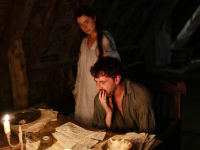
Games as a medium are constantly progressing and giving us new and exciting experiences which push the boundaries of storytelling and change our perceptions of narrative. Developer Variable State looks to join this burgeoning “game as art” ideology with their game Virginia, but does it succeed in the medium, or does it fail as a unique narrative?
To review a game like Virginia is a pretty tough prospect – in almost all descriptions it’s labelled as a first person thriller, but in actuality it’s an interactive narrative, and reviewing a narrative without spoiling the story is a difficult task to manage. Luckily, there are other aspects to any visual medium so I can still give you my opinion on varying aspects of Virginia.
Art-style-wise, the look of the game is a very strong one. Mixing bold colours with a minimalist art style, people are basic caricatures of humans, but still display character and emotion with basic movement and facial expression, whilst also constructing a small living world where you start to enjoy their company and in some cases grow attached to them. Going hand in hand with the art style is the fantastic ambient soundtrack of Lyndon Holland, which draws you in and adds a tremendous amount of gravitas to the twists and turns the story throws at you. Without the soundtrack, I have no doubt that these narrative elements would have been far less compelling.
The narrative aspect of Virginia is one similar to many of the modern story driven walking simulators where you progress from point A to B as the world around you unfurls and shows you a form of storytelling only possible within the medium of games. It does mix this up by adding transitions between certain parts of the story, so as not to keep you walking too long, which does add an element of filmography to the game that does make it feel more like the TV shows from the 80’s its trying to emulate.
As a game, it does take the elements it uses and constructs a living love letter to all the things that inspired it. The only problem being that the love letter is scrawled on a dirty napkin and just reads “TWIN PEAKS?” in massive uneven letters. As much as it apparently draws from David Lynch, the X-files and all 80’s stylised detective shows, it misses out crucial points of each. It’s kind of weird like a David Lynch creation but it lacks the unique characters that keep you invested in shows like Twin Peaks or films like Naked lunch, like the X-files it’s about someone in a position of authority being thrown into the unknown but it lacks the transitions between normality and impossibility being understandable or even comprehendible by the audience, and like all 80’s detective shows it has a unique coolness to the way it looks and feels but it fails to ever move upwards from that and use it to push its own uniqueness on the audience.
Virginia is a game that I feel was marketed as something completely different to what it actually turned out to be. What I thought would be an exciting crime thriller, which treads the line between surrealism and realism actually turned out to be an interactive narrative with a confusing story arch. That’s not to say it’s all bad as I actually started the game enjoying it and was excited to see everything Virginia had to offer, but as I got to the end of the mere 2 hour story I started finding myself wanting it to end so I could finish my time with the game and move onto something else.
Author: Hal, Plymouth store






